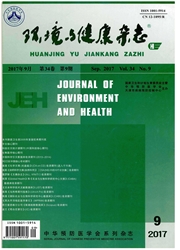

 中文摘要:
中文摘要:
目的研究两种抗菌剂三氯生(triclosan,TCS)和三氯卡班(triclocarban,TCC)在环境相关浓度水平对嗜热四膜虫体内抗氧化酶活力的影响。方法将处于对数生长期的嗜热四膜虫分别暴露于0(对照)、0.1、100txg/L的TCS和TCC培养24h,测定嗜热四膜虫体内超氧化物歧化酶(SOD)、过氧化氢酶(CAT)、谷胱甘肽-S转移酶(GST)和乳酸脱氢酶(LDH)的活力。结果与对照组比较,各浓度TCS和TCC暴露均可诱导嗜热四膜虫体内SOD活力明显升高(P〈0.05或P〈0.01),LDH活力明显下降(P〈0.01);各浓度TCS暴露均可诱导嗜热四膜虫体内CAT和GST活力均明显升高(P〈0.05或P〈0.01),但各浓度TCC暴露对这两种酶的影响均不显著。结论TCS和TCC在环境相关浓度水平下能够诱导嗜热四膜虫产生抗氧化应激。
 英文摘要:
英文摘要:
Objective To study the effects of two antibacterial agents, i.e. triclosan (TCS) and triclocarban (TCC) at the environmental relevant concentration on Tetrahymena thermophila through testing the changes of superoxide dismutase (SOD), catalase (CAT), glutathione S-transferase (GST) and lactic dehydrogenase (LDH). Methods T. thermophila, in a logarithmic growth period,were exposed respectively to 0 (control),0.1,100μg/L TCS and TCC for 24 h. The activities of SOD, CAT, GST and LDH in T. thermophila were tested. Results Compared with the control group,TCS and TCC at all tested concentrations could significantly induce the increase of SOD activity (P〈0.05 or P〈0.01),and the decrease of LDH activity (P〈0.01). The activities of CAT and GST did not obviously changed in TCC exposure groups, but increased significantly in TCS groups(P〈0.05 or P〈0.01). Conclusion TCS and TCC at the environmental relevant concentrations may induce antioxidative stress in T. thermophilca .
 同期刊论文项目
同期刊论文项目
 同项目期刊论文
同项目期刊论文
 期刊信息
期刊信息
